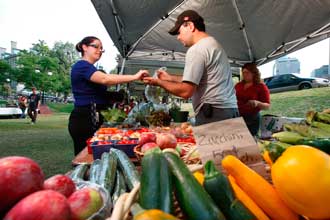What do high-density bike racks, assessing access to childcare, and reducing mercury use in microscopy have in common? Though these projects may seem completely unrelated, they are all funded by the Sustainability Projects Fund (SPF). And yours could be, too.
Founded in 2009, the SPF is a beacon of collaboration between McGill students and administration. That year, students voted to allot a $0.50 per credit fee, which was matched dollar-for-dollar by the administration, to form one of the largest sustainability funds in North America. To date, the SPF has raised some $3 million to finance over 120 unique sustainability initiatives across both McGill campuses.
The radical idea was merely a pilot project for the first three years of its existence. But this past spring, McGill students voted for the renewal of the SPF for another five years. Students of the Post-Graduate Student’s Society voted 65 per cent in favor of renewing the SPF, while undergraduates belonging to the Students’ Society of McGill University voted 88 per cent in favour, and Macdonald Campus Students’ Society, 78 per cent. The McGill administration has also maintained its commitment to the fund, once again providing full matching.
Today, the scope of sustainability embodied by the SPF has broadened. SPF projects encompass endeavors concerning research, education, connectivity, and operations, as well as governance and administration. In other words, the SPF is ambitious – it aims to fund much more than on-campus recycling programs. “The goal of the SPF is to shift business as usual towards sustainability,” says Sustainability Officer, Lilith Wyatt. “Working towards a flourishing future for humans and the planet is complex and messy, and it will require a multi-pronged solution.”
The renewal of the SPF underlines the support and enthusiasm for sustainability across the University – and is proof that the concept behind the SPF is sound. Iconic projects like the Farmer’s Market and La Cave bike collective have become mainstays of campus culture. Given opportunity and funding, visionary individuals are taking their ideas and implementing them in a collaborative way. Over 80 per cent of SPF funded projects have teams composed of staff, faculty and students.
The mandate of the SPF has always been to create a “culture of sustainability at McGill,” but it chooses to let bright McGill minds envision the details of this culture themselves. According to Wyatt, sustainability certainly includes – and the SPF funds – activities like recycling and composting and local food projects, but it can also mean rethinking curriculum, or building indigenous awareness on campus. What is certain is that the diversity of sustainability initiatives at McGill will become increasingly rich and robust over the upcoming five years.
The renewal of the fund comes at a time when students are increasingly choosing to attend universities that give them experiences that allow them to make a difference in their communities. The SPF is a key way for individuals aspiring to create social change to make these kinds of opportunities for themselves. Not surprisingly, 75 per cent of SPF project team members report feeling more connected to the McGill community after their involvement with an SPF project.
“McGill is an institution full of brilliant people with creative and innovative ideas,” says Wyatt. For another five years, the SPF will be bringing these individuals out of the woodwork and helping their ideas take shape.
The last Sustainability Projects Fund application deadline for this semester is Monday, Nov. 25. Projects can be in the categories of research, education, connectivity, operations, or governance & administration. Visit the Sustainability Projects Fund website to learn more about the SPF and apply for funding.

